ensembles with voice
-
Beach - Ecstasy - Voice (or Afl), Alto Flute (or Cl), and Piano
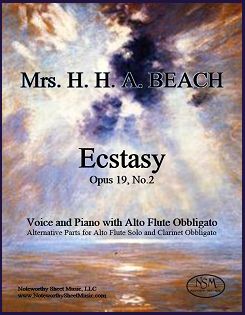 Ecstasy, Op.19 No.2, by Mrs. H. H. A. Beach
Ecstasy, Op.19 No.2, by Mrs. H. H. A. Beach
Two versions, for "Low voice (in Db)" or "High voice (in Eb)", with Alto Flute Obbligato (transcribed) and Piano.
Alternative parts for Alto Flute Solo and Bb Clarinet Obbligato.
Program Notes by Peter H. Bloom.
Piano Scores, Voice Parts, Alto Flute Obbligato Parts, and alternative Alto Flute Solo Parts and Clarinet Obbligato Parts; PDF $8.99Noteworthy Sheet Music is thrilled to publish our edition of Amy Marcy Cheney Beach's song Ecstasy in 2017, in celebration of the 150th anniversary of the composer's birth. The idea to make Ecstasy available to a broader combination of players and singers came from flutist Peter H. Bloom, who proposed that the piece would be an excellent vehicle with which instructors might inform students (early and advanced alike) about interpretation of the highly romantic late 19th century idiom. To that end, we have packaged together in a single edition Mrs. H. H. A. Beach's two versions of Ecstasy, for "low voice (in Db)" and "high voice (in Eb)", with each version including transcriptions of the obbligato (originally for violin) for either alto flute in G or clarinet in Bb, and an alternative solo part in the form of an alto flute transcription of the voice line. Thus, multiple performance variations
... -
Bloom - From the Drawer - Tenor or Soprano and Saxophone Quartet
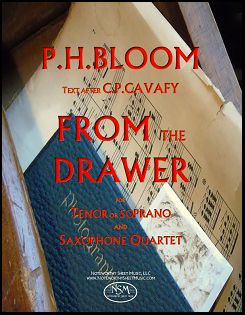 From the Drawer, for Voice and Saxophones, by Peter H. Bloom
From the Drawer, for Voice and Saxophones, by Peter H. BloomContemporary Composition for Tenor or Soprano, with Saxophone Quartet
Score and Parts, PDF $13.99
Boston-based flutist Peter H. Bloom created two versions of his composition From the Drawer, the edition listed here for Tenor or Soprano with Saxophone Quartet (soprano saxophone, alto saxophone, tenor saxophone, and baritone saxophone) and a second edition for Tenor or Soprano with Flute (doubling Piccolo), Clarinet, Bassoon, and Horn; both editions have been published by Noteworthy Sheet Music. The score provides a musical setting for the intensely emotional
... -
Bloom - From the Drawer - Tenor or Soprano, Flute, Clarinet, Bassoon, Horn
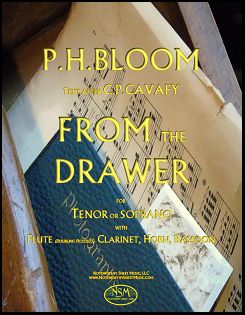 From the Drawer, by Peter H. Bloom
From the Drawer, by Peter H. BloomContemporary Composition for Tenor or Soprano, with Flute (doubling Piccolo), Clarinet in B-flat, Bassoon, and Horn in F
Score and Parts, PDF $13.99
Peter H. Bloom is a Boston-based flutist, whose original compositions and arrangements are published by Noteworthy Sheet Music. From the Drawer was written for Tenor or Soprano, with Flute (doubling Piccolo), Clarinet, Bassoon, and Horn, and provides a musical setting for the intensely emotional poem by Constantine Cavafy.
Here are Peter Bloom's comments about From the Drawer from the composer's preface (Copyright © 2015) to the edition:
"Constantine Cavafy’s 1923 poem, From the Drawer, captures the acerbic condition of longing, the impossibly private nature of affection, and the occultation of time. Its poignancy is universal; transcending gender, age, era, place, and even translation. Rather than rely on one particular translation of Cavafy’s text, I’ve drawn on a number of versions to arrive at a paraphrase that both informs and is shaped by the
... -
Brahms - Drei Duette - 2 Voices and/or Instruments and Piano
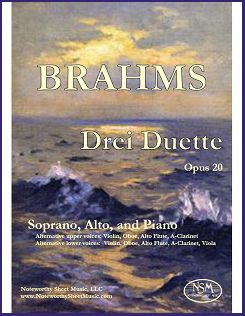 Drei Duette, Op.20, by Johannes Brahms
Drei Duette, Op.20, by Johannes Brahms
Transcribed for Mixed Voice, Instruments, and Piano by John W. Pratt
Score for Soprano, Alto, and Piano; Transcribed upper voice Parts for Violin/Oboe, Alto Flute, and A-Clarinet; and Transcribed lower voice Parts for Violin/Oboe, Alto Flute, A-Clarinet, and Viola; PDF $12.99Composed in 1858–1860, the Drei Duette, Op. 20, for soprano and alto are the earliest of Johannes Brahms' duets and quartets for solo voices and piano. The three songs are titled Weg der Liebe (1. Teil), Weg der Liebe (2.Teil), and Die Meere. Except for brief canonic passages in No. 1, the voices have the same words, sung simultaneously, mostly in parallel thirds and sixths. The accompaniments are straightforward, without Brahmsian ensemble challenges but not without harmonic interest. Many have found the songs Mendelssohnian. The words come from the collection Stimmen der Völker of Johann Gottfried Herder (1744–1803). The first two are translations by Herder of two parts of a Northern English folk poem Love will find out the Way. The third is Italian in origin.
The vocal parts lie well for many instruments, opening the possibility of mixed voice and instrument, as well as fully-instrumental, performances. If one
... -
Gifford - The Pied Piper of Hamelin - An Operetta
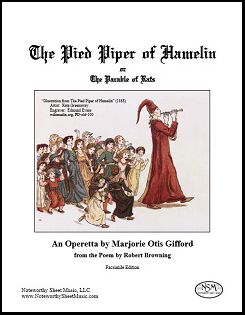 The Pied Piper of Hamelin, by Marjorie Otis Gifford
The Pied Piper of Hamelin, by Marjorie Otis GiffordAn Operetta, from the Poem by Robert Browning
Facsimile Edition by Noteworthy Sheet Music, LLC, PDF $24.99Marjorie Otis Gifford (1909-2003) was a composer, choirmaster, and long-time music and piano teacher in CT and NY. At age 24, she put music to Robert Browning's classic poem The Pied Piper of Hamelin, creating a children's operetta for her students. In her preface to the operetta, Mrs. Gifford states that perhaps the best performance of The Pied Piper was at the Lenox School in NYC, where she was teaching in 1938; that production was directed by Antoinette Perry, who later became known as 'Tony' of the Tony Awards. Indeed, there are additional famous personalities and much fascinating history associated with the remarkable life of Marjorie Otis Gifford.
The Pied Piper of Hamelin operetta was brought to NSM's attention by Gale Finlayson, daughter of composer and music educator Walter Finlayson, and we created our facsimile edition of the operetta at Gale's request. Marjorie Otis Gifford and Walter Finlayson were great friends, and in her preface Mrs. Gifford credits Mr. Finlayson with putting her operetta down on paper. NSM has received permission to publish the operetta from both the executor
... -
Massenet - On Dit! - trans. Clarinet, Voice and Piano
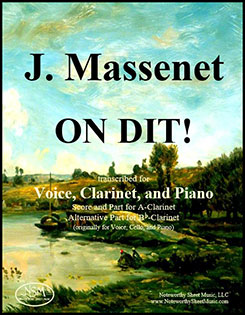 On Dit!, by Jules Massenet
On Dit!, by Jules MassenetTranscribed for Clarinet, Voice and Piano by C. A. Vater
Score for Clarinet, Voice and Piano; Alternative Parts for A-Clarinet and B-flat-Clarinet, PDF $8.99
Massenet’s composition On dit! is a musical setting of the eponymous poem by Jean Roux in which the poet ponders how the word “love” is commonly and inevitably associated with the sweetness and delights of spring. In addition to the vocal line and piano accompaniment, Massenet provided On dit! with a prominent part for cello. The cello line can be readily adapted for clarinet, creating a lovely and suitable new version of the piece for clarinet, voice, and piano. Our Noteworthy Sheet Music edition includes a score in concert pitch, as well as individual parts for either A-clarinet or B-flat-clarinet transcribed from the original cello part. Clarinetists in possession of both A and B-flat instruments may develop a personal preference for playing this piece on one instrument over the other, based on tone quality, complementarity with a particular singer’s sound, etc.
Score, 5 pages; A-Clarinet Part, 2 pages; B-flat-Clarinet Part, 2 pages; Total, 16 pages.
... -
Schnauber - Not-Pooh Songs - Female Voice and Flute or Female Voice and Oboe
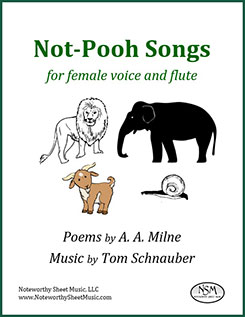 Not-Pooh Songs, by Tom Schnauber
Not-Pooh Songs, by Tom SchnauberFor Female Voice and Flute or Female Voice and Oboe, 2 editions
Score for Female Voice and Flute, PDF $18.46
Score for Female Voice and Oboe, PDF $18.46Tom Schnauber’s Not-Pooh Songs are absolutely delightful. The composer has set to music six children’s poems by A. A. Milne, four from When We Were Very Very Young (“The Alchemist”, “The Mirror”, “The Four Friends”, and “If I Were King”) and two from Now We Are Six ("The Charcoal Burner" and "The Engineer"). The work is offered by Noteworthy Sheet Music, LLC in two publications, one for female voice and flute, the other for female voice and oboe. The oboe line is sufficiently different from the flute line in terms of register to warrant it being published as a separate edition (i.e., the flute version makes use of that instrument’s wider range by putting some material in higher octaves). Also, the flute edition includes an alternate variation of “The Mirror” for voice and alto flute, whereas the oboe edition includes an alternate variation of “The Mirror” for voice and English horn.
... -
Schubert - Auf dem Strom - Vo/Cl/Pf
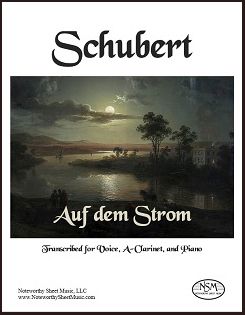 Auf dem Strom, Op.119, by Franz Schubert
Auf dem Strom, Op.119, by Franz SchubertObbligato transcribed for A-Clarinet by C. A. Vater
Piano Score and Parts for Voice and A-Clarinet, PDF $9.50
The great Austrian composer Franz Peter Schubert (1797-1828) was a master at creating extremely beautiful, melodic, emotional lieder. His song Auf dem Strom (On the River) provided a musical setting for the text of the eponymous poem written by the German poet and music critic Ludwig Rellstab. The lyrics tell the story of a sad parting, of the yearning and loneliness that sets in as the narrator bids farewell to a loved one on shore, while his river journey carries him away towards the sea. The premier performance of Auf dem Strom took place in Schubert’s 1828 public concert, during which the obbligato part was played by Josef Lewy on horn, the instrument for which the obbligato was written and which undoubtedly can provide an appropriately mournful, sentimental character to the piece. However, an alternate obbligato version for cello was also published. Now, with all respect, we provide an A-clarinet version of the obbligato, in expectation that clarinetists will appreciate this addition to the voice/clarinet/piano repertoire. We believe that a well-played clarinet can aptly contribute a suitably complex, dolorous essence
... -
Schubert - Auf dem Strom - Voice/Bass Flute/Pf
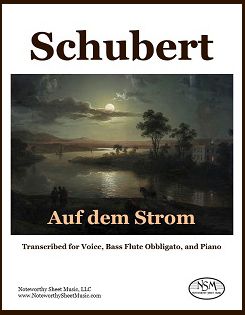 Auf dem Strom, Op.119, by Franz Schubert
Auf dem Strom, Op.119, by Franz SchubertObbligato transcribed for Bass Flute by C. A. Vater
Piano Score and Parts for Voice and Bass Flute, PDF $9.50
...
The great Austrian composer Franz Peter Schubert (1797-1828) was a master at creating extremely beautiful, melodic, emotional lieder. His song Auf dem Strom (On the River) provided a musical setting for the text of the eponymous poem written by the German poet and music critic Ludwig Rellstab. The lyrics tell the story of a sad parting, of the yearning and loneliness that sets in as the narrator bids farewell to a loved one on shore, while his river journey carries him away towards the sea. The premier performance of Auf dem Strom took place in Schubert's 1828 public concert, during which the obbligato part was played by Josef Lewy on horn, the instrument for which the obbligato was written and which undoubtedly can provide an appropriately mournful, sentimental character to the piece. However, an alternate obbligato version for cello was also published. Now, with all respect, and at the suggestion of our flutist colleague Peter H. Bloom, we offer a bass flute version of the obbligato. Most of the transposed horn part falls nicely within the sweet range of the bass flute, and very few adaptations were